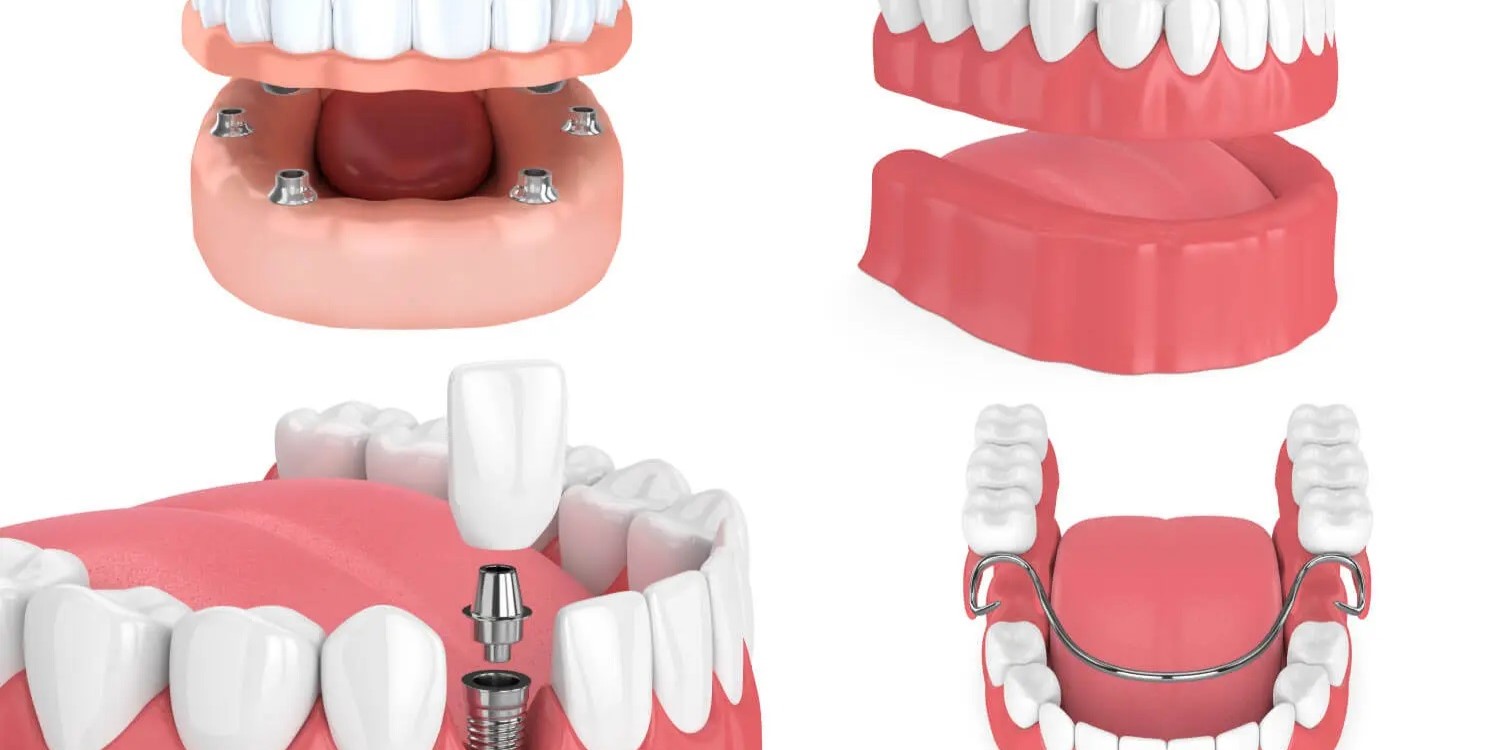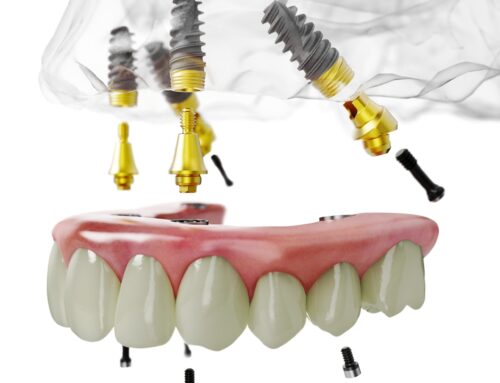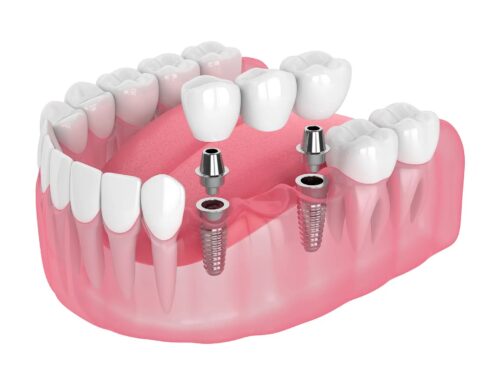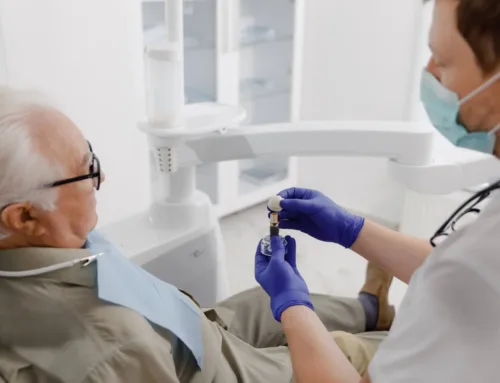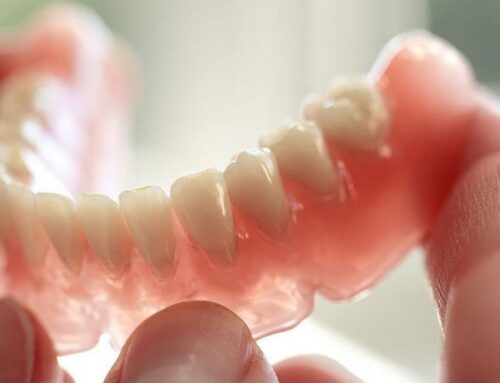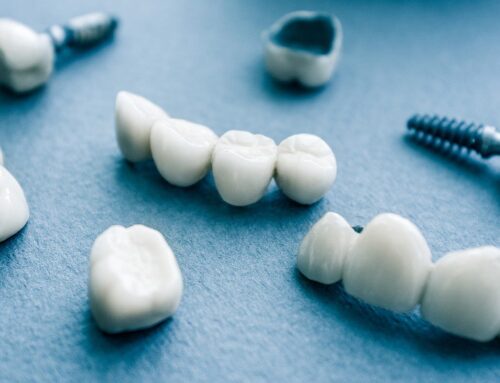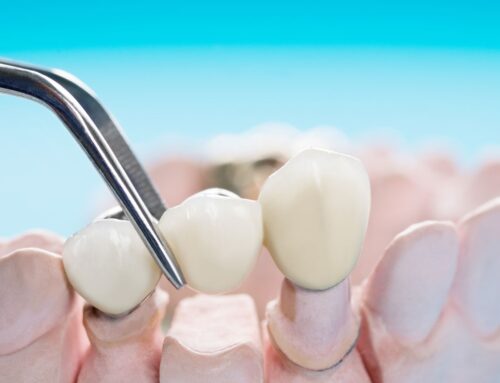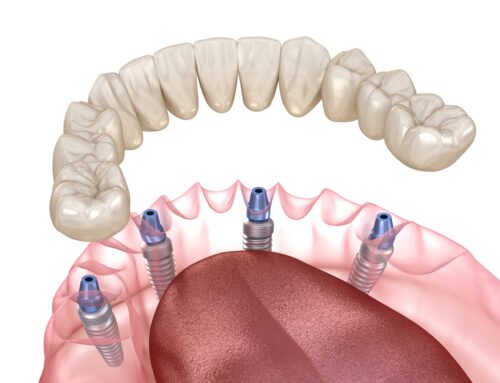Biting Into Life Again
A Senior’s Journey from Dentures to Implants
Disclaimer: Marion is a fictional patient used to represent the typical experiences of seniors who transition from dentures to dental implants. Her age and dental condition reflect common patterns among older patients.
A Common Challenge for Seniors
Tooth loss is a common part of aging. By the time many adults reach their 60s or 70s, years of wear, gum disease, decay, or injury may have resulted in the loss of most or all of their natural teeth. For decades, the most common solution has been full dentures. But while dentures can restore appearance and basic oral function, they come with significant drawbacks that can impact health, comfort, and confidence, especially as time goes on.
Marion, a 72-year-old patient at Georgian Dental, had been wearing full dentures for nearly a decade. Over time, she experienced common issues, reduced chewing ability, discomfort from shifting dentures, pressure sores, and the emotional toll of never feeling completely confident in her smile. Like many seniors, she began exploring permanent alternatives and ultimately transitioned to dental implants, a change that dramatically improved her comfort, health, and quality of life.
This article outlines the process of transitioning from dentures to implants, what seniors like Marion can expect, and why implant-based solutions are becoming increasingly popular for older adults.
Why Dentures Often Fall Short
Traditional dentures are often the first solution offered to seniors with complete tooth loss. While they do provide a functional and affordable option, they are not without compromise.
Common complaints include:
- Instability and Movement
Dentures rest on the gums and rely on suction or adhesives to stay in place. Over time, jawbone shrinkage can cause them to become loose, resulting in shifting or slippage while eating or speaking.
- Reduced Chewing Efficiency
Because dentures sit on the gums rather than being anchored in bone, chewing power is limited. Tougher foods like meat, raw vegetables, nuts, or crusty bread often become difficult or even impossible to eat comfortably.
- Changes in Taste
Upper dentures cover the roof of the mouth, reducing the sense of taste and affecting the enjoyment of food.
- Gum Irritation
Ill-fitting dentures can cause pressure sores, inflammation, and pain, particularly during eating or extended wear.
- Bone Loss
Without the stimulation that natural teeth or implants provide, the jawbone gradually deteriorates, changing facial appearance and denture fit over time.
Dental Implants: A Permanent Solution
Dental implants offer a modern and highly effective alternative to dentures. They provide a permanent foundation for replacement teeth by integrating directly into the jawbone, much like natural tooth roots.
For patients like Marion, transitioning from dentures to implants offers multiple benefits:
- Stable, fixed teeth that do not shift or move.
- Stronger chewing ability.
- Restoration of facial structure by preventing further bone loss.
- Improved comfort and oral health.
- No need for adhesives or removal at night.
- Better overall quality of life.
Types of Implant Solutions for Seniors
- Single implants – Used when only one or a few teeth are missing.
- Implant-supported bridges – Replace several teeth using fewer implant posts.
- Implant-supported dentures – A removable denture that “snaps” onto implants for improved stability.
- All-on-4® or All-on-6 implants – A full arch of fixed teeth supported by four to six implants, ideal for complete upper or lower restoration.
For Marion, the All-on-4 technique was selected to replace both her upper and lower dentures with full arches of fixed, implant-supported teeth.
Learn more about dental implants for seniors.
A Step-by-Step Implant Process for Seniors
The journey from dentures to implants involves several key stages. Here’s a breakdown of what patients like Marion can expect.
- Initial Consultation and Assessment
The first step is a comprehensive evaluation with an experienced implant dentist. This typically includes:
- Medical and dental history review.
- Examination of existing oral structures.
- Digital X-rays and 3D CBCT scans to assess bone quality and volume.
- Discussion of goals, lifestyle, and expectations.
- Exploration of suitable treatment options (e.g., All-on-4 vs. snap-in dentures).
At Georgian Dental, Marion’s assessment confirmed that she had sufficient bone to support full-arch implants without needing grafting, making her an ideal candidate for All-on-4.
- Treatment Planning
Once candidacy is confirmed, a detailed treatment plan is developed. This includes:
- Number and location of implants.
- Type of prosthesis (fixed bridge, removable denture, hybrid).
- Timeline and sequencing.
- Sedation options.
- Financial planning and insurance coordination (if applicable).
Patients are also educated on the post-operative healing process, oral hygiene expectations, and dietary guidelines.
For Marion, the plan involved removing a few remaining non-viable teeth, placing four implants in each jaw, and attaching temporary fixed teeth the same day.
- Surgical Phase: Implant Placement
Implants are placed in a surgical appointment, typically lasting a few hours. Conscious sedation or IV sedation is often available for comfort, especially in seniors who may have dental anxiety or special medical considerations.
Procedure steps include:
- Removal of any failing teeth.
- Preparation of the jawbone.
- Placement of four titanium implants per arch (angled to maximize bone contact).
- Attachment of a temporary full-arch prosthesis for immediate function.
Patients typically go home the same day with detailed aftercare instructions.
In Marion’s case, she was able to leave the clinic with a secure, fixed set of temporary teeth already in place. No gaps, no adhesives, and no waiting for dentures to arrive.
- Healing and Osseointegration (3-6 months)
Over the next several months, the implants naturally bond with the surrounding bone, a process called osseointegration. This period is critical to ensure the implants become a strong and stable foundation for the final teeth.
During this time:
- Patients wear their temporary teeth for function and appearance.
- A soft-food diet is recommended initially, progressing to firmer foods as healing allows.
- Routine check-ups are scheduled to monitor healing and make minor adjustments.
Marion followed a progressive diet and visited Georgian Dental for follow-up assessments. She reported increased confidence with each passing week as she resumed eating more of her favourite foods.
- Final Prosthesis Placement
Once osseointegration is complete (typically around 4–6 months), the temporary teeth are replaced with a permanent set.
Features of the final prosthesis:
- Custom-milled for precise fit and aesthetics.
- Made from durable materials like zirconia or acrylic.
- Designed to match the shape, size, and shade of natural teeth.
- Built for optimal function and hygiene.
Marion’s permanent teeth were designed to enhance her facial features and improve her bite. After years of compromise, she was finally able to smile, chew, and speak naturally again.
- Long Term Maintenance
Dental implants are a long-term investment, but they require consistent care. Fortunately, implant maintenance is straightforward and similar to caring for natural teeth.
Post-treatment care includes:
- Brushing twice daily with a soft-bristled brush.
- Flossing or using water flossers around implants.
- Routine dental cleanings and checkups (every 6 months).
- Avoiding habits like smoking or chewing hard items (ice, pen tips).
Georgian Dental provides patients like Marion with personalized oral hygiene guidance and continued support to maintain implant health over time.
Why Seniors Are Choosing Dental Implants
While some seniors initially assume they may be too old for implants, age alone is not a disqualifying factor. In fact, the benefits for older adults can be even more profound.
Key Benefits for Seniors:
- Enhanced chewing function leads to better nutrition and digestion.
- Improved speech reduces embarrassment and increases social comfort.
- Prevention of bone loss supports long-term facial structure.
- Restored self-esteem encourages social engagement and overall well-being.
- Ease of use eliminates the daily routine of removing, cleaning, and gluing dentures.
Marion’s transition allowed her to enjoy everyday moments again, sharing meals with family, smiling in photos, and speaking confidently in conversations.
Addressing Frequently Asked Questions
Am I too old for dental implants?
No. Patients well into their 70s and 80s have received implants successfully. What matters more is your general health, bone condition, and commitment to oral care.
What if I’ve already lost bone in my jaw?
All-on-4 implants are often ideal for patients with some bone loss. The angled placement avoids the need for grafting in most cases.
Will the surgery hurt?
Most patients experience only mild discomfort post-surgery. Sedation options are available to ensure comfort during the procedure.
Are implants really better than dentures?
For many patients, yes. Implants offer superior function, stability, and quality of life with fewer daily frustrations compared to removable dentures.
How long do implants last?
Dental implants can last 25+ years with proper care. The prosthetic teeth may eventually require repair or replacement, but the implant posts can remain in place for decades.
Understanding the Cost of Dental Implants
One of the most common concerns for seniors considering implants is the financial aspect. Implant dentistry requires a significant investment, especially compared to traditional dentures, which have a lower upfront cost. However, when you factor in long-term benefits, both functional and financial, the value of implants becomes clear.
What’s Included in the Cost?
- Initial consultation and digital diagnostics (X-rays, CBCT scans).
- Surgical placement of implant posts.
- Temporary and permanent prosthetic teeth.
- Post-operative care and follow-up appointments.
- Materials and lab work for custom restorations.
Implant-supported teeth don’t require adhesives, relining, or replacement every few years like traditional dentures. When properly maintained, they can last decades, saving time, effort, and money in the long run.
At Georgian Dental, we work with patients to make treatment more accessible:
- Transparent, all-inclusive pricing.
- Flexible payment plans to spread costs over manageable monthly installments.
- Assistance navigating insurance coverage and medical financing options.
Our team helps ensure that cost does not become a barrier to regaining your quality of life.
Mental and Emotional Benefits of Dental Implants
It’s easy to focus on the functional improvements dental implants provide, chewing power, speech clarity, and facial support. But the emotional and psychological effects are just as powerful, especially for seniors who have struggled with tooth loss for years.
Tooth loss can lead to embarrassment, social withdrawal, and even depression in older adults. Many report feeling “less like themselves” after years of dental decline. Replacing missing teeth with implants often provides a renewed sense of confidence that extends into every aspect of life.
Patients commonly describe:
- Feeling younger and more energized.
- Enjoying more active and social lifestyles.
- Increased interest in dining out, travelling, or meeting new people.
- Greater motivation to maintain overall health.
In Marion’s case, the ability to participate in family gatherings without discomfort or worry transformed how she saw herself. The smile she regained wasn’t just about aesthetics, it was about reclaiming her presence in the world.
Why Choose Georgian Dental for Your Dentures & Implants?
At Georgian Dental in Barrie, we’ve helped countless seniors, just like Marion, regain their comfort, confidence, and independence through dental implants.
Our practice offers:
- Initial comprehensive appointments and advanced 3D imaging.
- Specialized experience in full-mouth restorations and All-on-4 treatments.
- Comfort-focused care with sedation dentistry options.
- Personalized treatment plans for every age and dental history.
- In-house lab and digital planning tools for faster, more precise results.
- Flexible financing options to make treatment accessible.
Bite Into Life Again with Dental Implants
If you’re tired of the limitations of traditional dentures or struggling with missing teeth, now is the time to consider a lasting solution. Dental implants can help you reclaim the ability to eat, speak, and smile with freedom and confidence.
Don’t settle for a life defined by discomfort and dietary restrictions. Let Georgian Dental help you take the next step today.
Appointment Request
If you’re interested in any of our procedures, and would like to meet with one of our dentists to discuss options, costs and get additional information, complete this short form and we’ll give you a call to arrange for a no-obligation appointment at our Barrie clinic.
